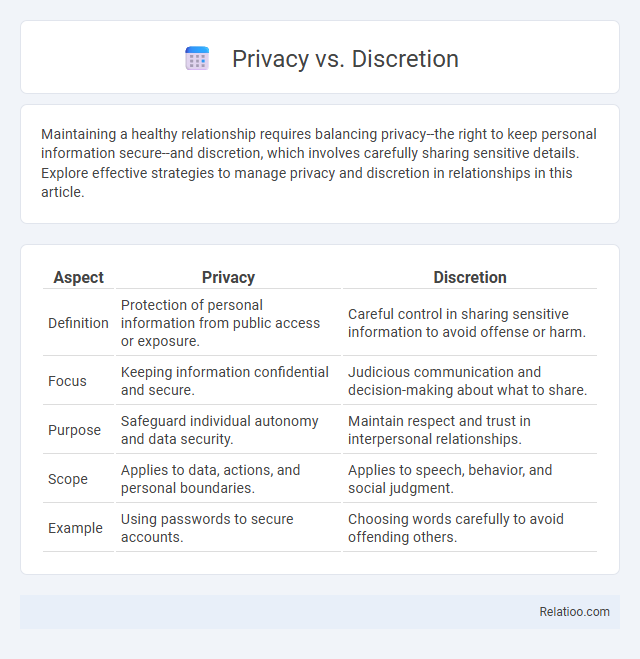Maintaining a healthy relationship requires balancing privacy--the right to keep personal information secure--and discretion, which involves carefully sharing sensitive details. Explore effective strategies to manage privacy and discretion in relationships in this article.
Table of Comparison
| Aspect | Privacy | Discretion |
|---|---|---|
| Definition | Protection of personal information from public access or exposure. | Careful control in sharing sensitive information to avoid offense or harm. |
| Focus | Keeping information confidential and secure. | Judicious communication and decision-making about what to share. |
| Purpose | Safeguard individual autonomy and data security. | Maintain respect and trust in interpersonal relationships. |
| Scope | Applies to data, actions, and personal boundaries. | Applies to speech, behavior, and social judgment. |
| Example | Using passwords to secure accounts. | Choosing words carefully to avoid offending others. |
Understanding Privacy and Discretion: Definitions
Privacy refers to your right to control personal information and maintain boundaries between your private life and others. Discretion involves the careful judgment you apply when sharing sensitive information to protect confidentiality and relationships. Understanding these distinctions helps you manage what is shared and with whom, ensuring both respect and security in interactions.
Historical Context of Privacy and Discretion
The historical context of privacy and discretion reveals distinct but overlapping concepts shaped by societal norms and legal frameworks. Privacy traditionally centers on the protection of personal information and autonomy from external intrusion, evolving significantly through landmark legal cases and cultural shifts. Discretion, by contrast, emphasizes prudent judgment and confidentiality in decision-making, often rooted in professional ethics and social etiquette, balancing your right to privacy with the responsibility to manage sensitive information thoughtfully.
Key Differences Between Privacy and Discretion
Privacy involves the protection of personal information and freedom from unauthorized access, whereas discretion pertains to the careful judgment or choice in handling sensitive matters. Privacy is a right or condition ensuring confidential data remains secure, while discretion emphasizes the decision-making process about what information to share or withhold. Understanding the key difference lies in privacy being about safeguarding information and discretion focusing on the thoughtful management of that information.
Why Privacy Matters in the Digital Age
Privacy matters in the digital age because personal data is constantly collected, shared, and exploited across online platforms, making individuals vulnerable to identity theft, surveillance, and unauthorized profiling. Discretion involves the careful management of sensitive information to prevent misuse, while privacy fundamentally protects the individual's right to control their own data. Ensuring privacy fosters trust, safeguards freedom of expression, and upholds human dignity in an interconnected world dominated by digital communication.
The Role of Discretion in Personal Relationships
Discretion in personal relationships involves the careful management of sensitive information to maintain trust and respect between individuals. It governs the balance between sharing personal details and protecting privacy, ensuring that boundaries are honored without compromising emotional openness. Effective discretion strengthens intimacy by allowing individuals to control the flow of information and safeguard the relationship's integrity.
Legal Perspectives: Privacy Rights vs. Discretionary Powers
Privacy rights are constitutionally protected, limiting governmental intrusion into personal data and communications, while discretionary powers grant authorities flexibility in decision-making within legal boundaries. Courts often balance privacy protection with the necessity of discretion in enforcement, emphasizing proportionality and reasonableness to prevent abuse of power. Legal frameworks like the GDPR and Fourth Amendment exemplify this tension by safeguarding individual privacy against arbitrary or excessive discretionary actions by public officials.
Social Media: Navigating Privacy and Discretion
Balancing privacy and discretion on social media involves understanding how your personal information is shared and who can access it. Privacy focuses on controlling access to your data, while discretion relates to your judgment in what you choose to post or disclose. Your careful management of both aspects protects your reputation and maintains digital security in an increasingly transparent online world.
Balancing Transparency with Discretion in Professional Settings
Balancing transparency with discretion in professional settings requires maintaining confidentiality while fostering open communication to build trust and credibility. Privacy safeguards sensitive information from unauthorized access, whereas discretion involves judicious decision-making about what information to share and when. Effective professionals navigate this balance by transparently communicating essential details without compromising confidential data, thereby ensuring ethical standards and organizational integrity.
Protecting Privacy and Practicing Discretion: Best Practices
Protecting privacy involves safeguarding personal and sensitive information from unauthorized access, emphasizing encryption, secure communication channels, and strict data access controls. Practicing discretion means exercising careful judgment in sharing information, ensuring that only relevant details are disclosed to appropriate parties to maintain confidentiality. Best practices include implementing robust privacy policies, training employees on data handling protocols, and regularly auditing information-sharing processes to prevent leaks and breaches.
Future Trends in Privacy and Discretion
Future trends in privacy and discretion increasingly emphasize advanced data protection technologies, such as AI-driven encryption and decentralized storage systems, to safeguard personal information. Organizations are prioritizing user-centric privacy controls that empower you to manage your data visibility and consent effectively. The convergence of legal frameworks and technological innovations will drive more transparent and customizable discretion practices, balancing privacy rights with ethical information sharing.

Infographic: Privacy vs Discretion
 relatioo.com
relatioo.com